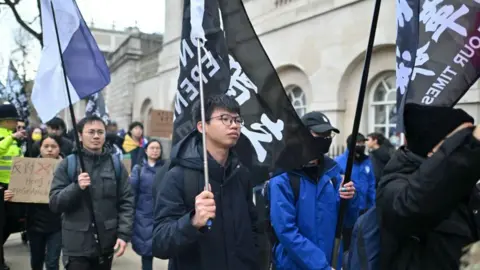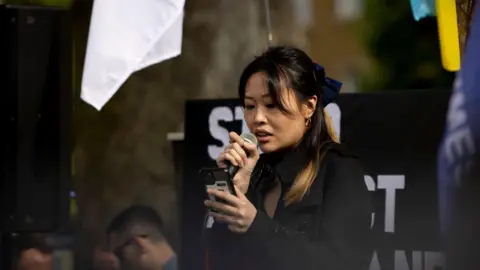Hong Kong offers rewards for arrest of six activists abroad
 Getty Images
Getty ImagesHong Kong police have offered rewards of HK$1m (£103,000; $129,000) for information leading to the arrests of six pro-democracy activists living in the UK and Canada.
Among them is Tony Chung, the former leader of a pro-independence group who fled to the UK last year.
The group - which includes a former district councillor, an actor, and a YouTuber - have been lobbying for more democracy in the territory. All have been accused of violating the city's national security law.
UK Foreign Secretary David Lammy criticised the move, calling on Hong Kong authorities to "end their targeting of individuals in the UK and elsewhere who stand up for freedom and democracy".
"We will not tolerate any attempts by foreign governments to coerce, intimidate, harass or harm their critics overseas, especially in the UK," he said, adding that the UK government was committed to supporting those from Hong Kong who have relocated to the UK.
Also on the wanted list is former district councillor Carmen Lau and activist Chloe Cheung. Both are based in the UK and lobby on behalf of two NGOs calling for more democracy in Hong Kong.
Arrest warrants were also issued for political commentator and pollster Chung Kim-wah, who left Hong Kong for the UK in 2022, as well as two people based in Canada: former actor Joseph Tay, who co-founded the NGO HongKonger Station, and Youtuber Victor Ho.
Mr Ho has been charged with subversion while the other six have been accused inciting secession and collusion with a foreign country or external forces.
According to Hong Kong's public broadcaster RTHK, the arrest warrants were announced by the city's top police chiefs on Tuesday, who accused some of the wanted activists of repeatedly requesting foreign countries to impose sanctions and other measures against China and Hong Kong.
Mr Chung was first convicted in 2021 for calling for Hong Kong's secession and was released in June last year.
He posted on Instagram on Tuesday that it was "an honour to become the first Hongkonger to be charged twice under the National Security Law".
Mr Chung said the news came as no surprise to him as he breached a supervision order after his release from prison by fleeing to the UK last year.
"I knew this day would come. From the moment I decided to leave Hong Kong, I was fully aware that I would not be able to return for a long time," he wrote.
Mr Chung confirmed to the BBC that he was still waiting for his asylum application to be approved by the UK government.
 Getty Images
Getty ImagesMs Lau posted on X that the warrant would not stop her advocacy work. She called on the UK, US and EU governments to impose sanctions on "Hong Kong human rights perpetrators".
She also asked the British Labour government to "seriously reconsider its strategies for tackling transnational repression targeting Hong Kongers" and to look at blocking plans for a new Chinese embassy in Tower Hill.
Earlier this month, Tower Hamlets councillors voted unanimously to reject the plans. However, the verdict is only advisory and not binding and it will be up to Deputy Prime Minister and Communities Secretary Angela Rayner to decide whether to grant permission or not.
This is the third round of arrest warrants and bounties issued since the Beijing-imposed National Security Law was imposed.
The first two rounds were issued in July and December last year, and targeted former lawmaker Nathan Law - who told the BBC last year that his life has become more dangerous since the bounty was announced - and Simon Cheng, a former UK consulate employee detained in 2019 in a high-profile case. Both men are now based in the UK.
China's foreign ministry spokeswoman Mao Ning backed the move on Tuesday, saying the Chinese government supported Hong Kong "performing its duties in accordance with the law",
She added that Hong Kong was "a society governed by the rule of law and no-one has extrajudicial privileges".
Hong Kong's controversial National Security Law was imposed in 2020 in response to the 2019 anti-government protests that rocked the city for months.
Beijing and Hong Kong authorities argue the law is necessary to maintain stability and deny it has weakened autonomy, but critics argue it has reduced the city's autonomy and made a wider range of dissenting acts illegal.
